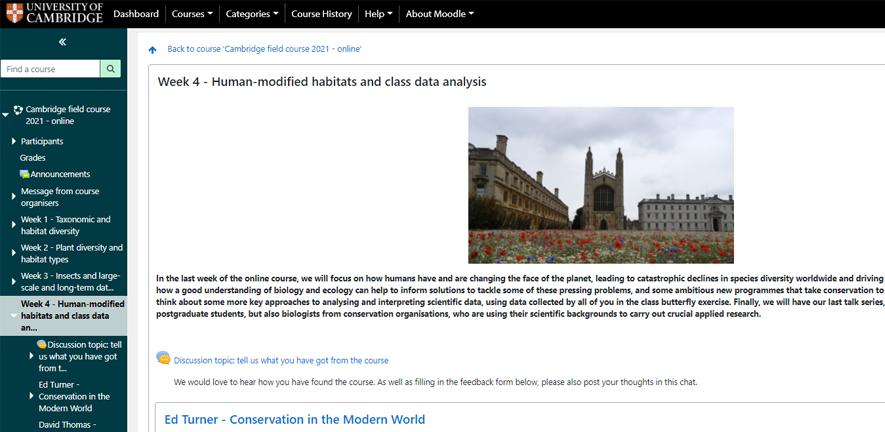
Submitted by Rachel Aucott on Tue, 31/08/2021 - 12:44
First ever Cambridge online field course
The final week of the first-ever natural sciences online field course has just started! It has been a great success with 120 1st and 2nd year students actively engaging with a huge range of lectures, talks and activities. Due to the global pandemic, these students have all missed out attending the optional field courses that usually occur during their three-year degrees.
The main aim of the course was to develop student’s understanding of biodiversity, habitats, study design and data collection, supporting them in developing their own independent projects later in their courses.
Extraordinary diversity of life
The first week explored some of the extraordinary diversity of life that shares the planet with us, how to start making sense of this diversity, and how to identify species to major groups. Students were introduced to project design and potential pitfalls in designing studies by Alec Christie and Sarah Luke.
Plant diversity and habitat types
Plant diversity and habitat types was the topic of the second week of the course. During this week, Ed Turner and David Coomes introduced students, via video, to the wide diversity of plants in two local areas; East Pit, a chalkland nature reserve and an ancient woodland at Madingley. Chantal Helm from Cambridge Botanic Gardens introduced the Fenland Habitat within the gardens.
Insects and large-scale studies
The theme of week 3 of the course was insects and large-scale studies. Students were encouraged to think about the value of large-scale and long-term data and how this can be collected through approaches such as citizen science. Jason Head, Curator of Vertebrate Palaeontology in the University Museum of Zoology, and Oscar Wilson a former PG student in Zoology introduced the value of looking at fossils and how such long-term data is useful for understanding changes in the UK and elsewhere.
Matt Hayes, a Research Assistant in the Museum of Zoology introduced iRecord, a popular data-sharing platform, where members of the public can enter records of species they have seen and have them verified or identified by experts.
Who will win the Cambridge Summer Field Course league?
iRecord will also be used during the first in-person Cambridge Field Course that starts in mid-September and the race is already on to see who can record the most species over both courses! 28 records have already been submitted by 19 members of the iRecord group!
Throughout the field course Cambridge postgraduates, who work in different parts of the globe, gave talks about their research, as well as how they got to be doing such amazing work.
The final week of the course will look at Human-modified habitats and class data analysis. Students will also hear from some conservation practitioners, carrying out applied research.
This has been a huge effort by a large number of people. There are too many to mention all of them but especial thanks must go to the following:
Course Organisers: Ed Turner, Adam Pellegrini, and Oscar Wilson
Instructors: Sarah Luke, Michael Pashkevich, Matt Hayes
Course administration: Georgina Rutherford, Francesca Anthony and Jacek Zalewski
Lecturers, Conservationists, and Postgraduate students from Zoology, Plant Sciences, Cambridge Conservation Initiative.
